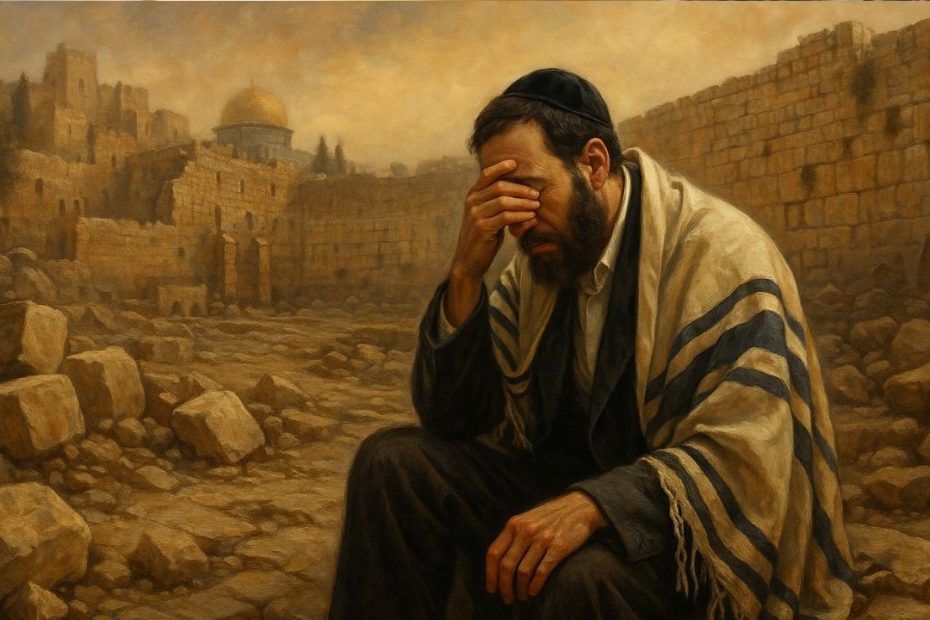בס”ד
This class explores a verse in Lamentations (5:1): “Remember, O L-RD, what has befallen us; Behold, and see our disgrace!”. Different explanations are offered based on teachings of the Baal Shem Tov (founder of the Chassidic movement) and other chassidic discourses (by the fifth Rebbe of Chabad (1919) and by the Rebbe (1953)). This verse is connected to Tisha b’Av, the ninth of Av.
Discovering Ma: Lamentations 5:1 Through the Teachings of the Ba’al Shem Tov
1. Introduction
In this reflection, we’ll learn one verse—Lamentations 5:1—and explore two profound teachings from the Ba’al Shem Tov, founder of the Chassidic movement. We’ll also trace how later discourses, particularly from the Fifth Rebbe of Chabad, Rabbi Shalom DovBer (the Rebbe Rashab), and the Rebbe (Rabbi Menachem Mendel Schneerson) himself, uncover subtle insights in the Ba’al Shem Tov’s thought—and how these insights can be lived, every day.
While these teachings were originally addressed to Jewish audiences in 18th-century Eastern Europe—Poland, Ukraine, Russia—where Jews lived mostly separate lives from non-Jews, these ideas touch the soul of every human being. I humbly believe they have broader relevance, and I’ll explain why below.
2. Setting the Scene
We turn to a single verse from the Book of Lamentations:
זְכֹ֤ר יי מֶֽה־הָ֣יָה לָ֔נוּ הַבִּ֖יטָה וּרְאֵ֥ה אֶת־חֶרְפָּתֵֽנוּ׃
“Remember, O L-RD, what has befallen us; Behold, and see our disgrace!”
—Lamentations 5:1
Written by the prophet Jeremiah (Yirmiahu HaNavi), this book captures the sorrow and tragedy of the destruction of the First Temple, nearly 2,500 years ago. On Tisha B’Av, we mourn that destruction, and this verse becomes a powerful collective outcry: Remember us—our Temple destroyed, our glory lost—take heed of our disgrace.
3. Desire Links a Prophetic Challenge
The Zohar draws a surprising parallel between Lamentations and a verse from Micah:
“My people, remember what Balak king of Moab plotted against you, and how Balaam son of Beor responded to him…” —Micah 6:5
Micah presents a challenge from G-d:
“You ask Me to remember you—so remember Me!”
This interaction reveals something striking:
- G-d does not forget. He is infinite.
- Humans forget. When we forget G-d, He mirrors that forgetting.
- So when we say, “Remember us,” G-d replies: “I remember—but do you?”
Thus, the verse becomes a mirror—calling us to remember G-d in our lives, constantly and intentionally. Divine remembrance flows from human remembering.
4. The Spiritual Meaning of “Ma”
The word ma (מה) literally means “what?” But in Kabbalah and Chassidic thought, it carries profound symbolism.
- מה (ma) has a gematria (numerical value) of 45.
- So does the word אדם (Adam)—the Hebrew word for human.
This indicates a deep connection:
- Ma reflects the essence of humanity—the spark of divinity in each person.
- Ma also implies nullification: a humble openness, a surrender of ego.
To ask “what?” is to acknowledge mystery, limit, and submission. In this way:
Ma stands for:
- The image of G-d in every person.
- Humility and surrender in our relationship with the Divine.
5. Two Teachings from the Ba’al Shem Tov
The Ba’al Shem Tov taught two distinct lessons from this same verse, depending on his audience:
A. To the Great Sages
These were Torah scholars who often looked down on the unlearned. His message:
“G-d, please remember our ma—our essence, our nullification—and reconnect us to it.”
They had acquired knowledge but lost humility. They had forgotten that every Jew, regardless of learning, shares the same divine soul.
Their plea: Let us remember our true humanity, which exists beyond intellect and rank.
B. To the Simple People
These were Jews with little formal education but deep devotion. The Ba’al Shem Tov’s message:
“G-d, please remember our ma—our humble, surrendered selves that are wholly devoted to You.”
They lived with faith, often sacrificing with no grasp of the spiritual heights they were achieving.
Their plea: Let our heartfelt surrender be remembered, even as we remain in exile.
6. The Dual Paths of Ma
So the same word—ma—has dual meaning:
- For the learned: A call to restore humility and reconnect with the divine spark that lies beneath their knowledge.
- For the simple: A recognition that their sincere surrender already expresses the deepest form of ma.
In both cases, the verse speaks directly to the heart, meeting each person where they are.
7. Working on Our Emotions and Intentions
Chassidic thought teaches that the human soul is distinct from animals in one core way: the power to direct emotions based on higher intellect.
We ask ourselves:
- Do we love material things, or do we love G-d?
- Do we fear poverty, or do we fear spiritual emptiness?
This verse, then, becomes an emotional cry:
“Help us invest our emotions in You. Align our love, fear, and decisions with our divine core.”
8. In Summary
We began with the simple meaning of Lamentations 5:1—a prayer that G-d remember our suffering.
We explored the deeper meaning of ma: human essence, humility, divine image, and spiritual surrender.
We saw how the Ba’al Shem Tov applied the same verse to two very different audiences: the proud (to recall humility) and the humble (to affirm their devotion).
And we’re left with questions for reflection:
Where is my ma?
Where is my essence—as a human, as a soul, as a creation of G-d?
What do I remember—and what have I forgotten?
In any spiritual station—learned or simple, Jewish or not—we all carry ma. We are all called to remember:
Who am I? Why am I here? What am I dedicating myself to?
Rabbi Tuvia Serber
The above is a representation of the spoken text converted to written text.
© Copyright, all rights reserved. If you enjoyed this article, we encourage you to distribute it further.
Our blogs may contain text/quotes/references/links that include copyright material of
Mechon-Mamre.org, Aish.com, Sefaria.org, Chabad.org, and/or AskNoah.org, which we use in accordance with their policies.
